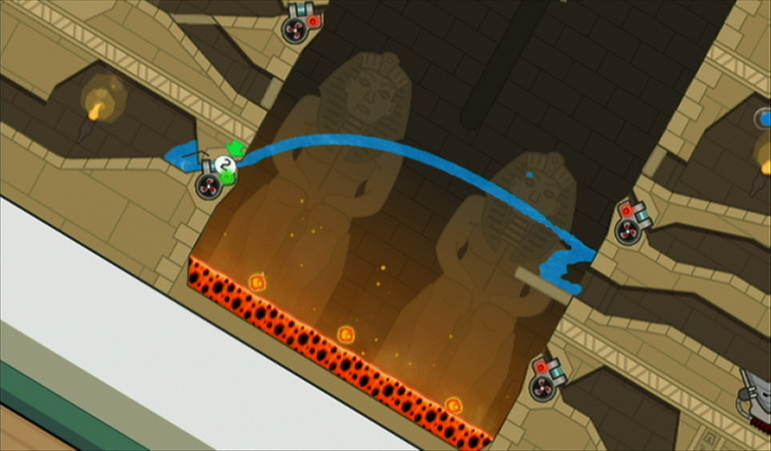
Fluidity is Super Metroid with water as the protagonist.
As strange as that sounds, this game owes a huge debt to that flagship series of Nintendo's. Basically, the game is some gobbledygook about a magic book that has been taken over by a black goo called "the influence," and it's your job to navigate a puddle of water through the book to defeat enemies and solve puzzles.
The setup itself isn't actually all that interesting – vague antagonist needs to be vanquished by equally vague protagonist – but the gameplay more than makes up for this by being really involving, intuitive and innovative (alliteration for the win!). Essentially, the game actually stars you as the protagonist, holding the magic book and turning it from side to side. The Wii remote, then, stands in as the magic book, and it's one of the few examples of motion control actually doing what it has purported to: creating a bond between the player and the game that would otherwise be lessened with traditional controls.
The gameplay would likely be kind of boring if you played as a standard videogame hero avatar, but here, playing as water opens up a number of really interesting gameplay possibilities. You can separate the water to solve various puzzles (of the pressure-plate/lever variety) or you can pool all the water together to gain momentum and not have water evaporate on you. Later on in the game, you also have the ability to turn into ice and, most intoxicatingly, a steam cloud, at which point the game turns into a shmup.
What Fluidity proves is that small changes can have a huge impact on traditional gaming genres. Besides the aesthetics (delightfully "textbook-y," if that makes any sense) and the change in avatar, Fluidity has the same structure as Super Metroid: finding powerups, navigating an interconnected world, unlocking it one bit at a time – but that one change changes everything. The game then becomes a test of wits as well as a test of your dexterity at manipulating a not-quite-solid character, and if it's not a particularly meaningful experience, it certainly is an enjoyable one. It's maybe a little sterile, and not nearly as engaging as Metroid is, but for $10, you can certainly do a lot worse.

lilt line, on the other hand, is perhaps one of the most fantastic games of the year. Though it only takes maybe an hour to play through, lilt line's unbelievable marriage of minimalistic aesthetics and "digital instrument" gameplay (I'll explain that in a bit) leaves most full retail releases of the year in its dust.
There's no denying that the game is very similar to the Bit.Trip games (and the fact that the game has been published by Gaijin Games only cements this fact), but the approach is a little different. lilt line is truly abstract – nothing as inelegant as a polygon enters into this world. In that way, it's a little bit like the Art Style games, except that lilt line goes even further in turning conventions on their head.
Looking like a 1980s day-glo t-shirt, lilt line is all about – as with the Bit.Trip series – the intersections between music and gameplay. But unlike the Bit.Trip series, which essentially acts as a gaming retrospective, lilt line seems to be asking the player to manipulate the titular line through abstract caves not as a reminder of, say, shmups (probably the closest analog I can think of for lilt line), but to effectively eradicate the traditionally held notions of gameplay. I mentioned earlier that playing lilt line was a bit like learning an instrument, and while this is a little bit true of most games in their complexity, the point is hammered home much harder here. Playing lilt line means being in tune to rhythm (quite literally, as you have to hit a button on the beat of the fantastically grimy electronic music on display here) as well as managing the navigation of your line through the caves of the game. Moreso than even a Rock Band or Guitar Hero game, lilt line felt like the spiritual cousin to playing an instrument.
Sure, this is only an hour of entertainment, but it's one of the best hours in gaming I've had all year. lilt line is a bold reminder of the possibilities of gaming to push beyond traditional boundaries, and it's a game you need to play, either on the iPhone or on WiiWare.
(Side note: besides the fact that Fluidity is I think a Nintendo published game, it might actually have been a better fit for the iPhone too. No matter.)